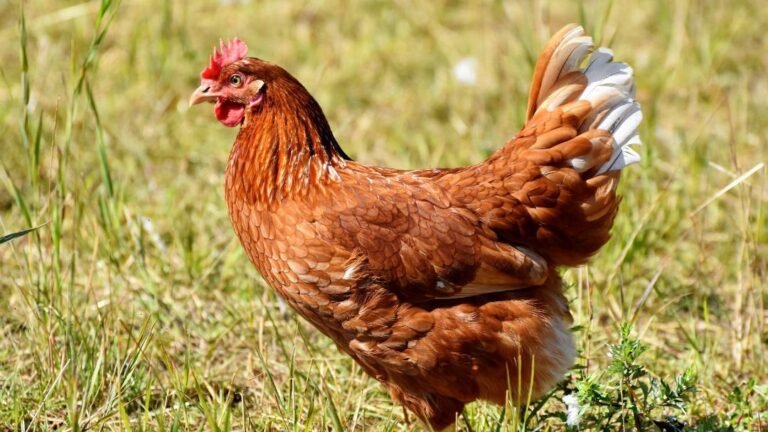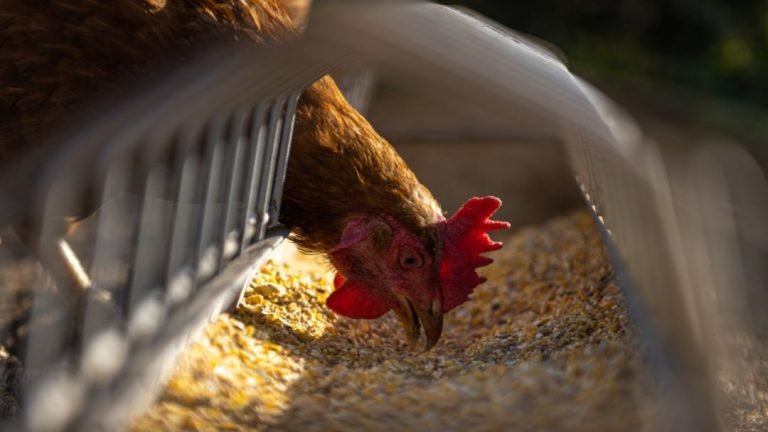Yes, chickens can eat parsley without any issues. Parsley is safe and nutritious for chickens.
Chickens can enjoy the benefits of parsley in their diet. Parsley is a herb that is rich in vitamins A, C, and K, as well as minerals like calcium and iron. It also contains antioxidants and is known for its diuretic properties.
Incorporating parsley into a chicken’s diet can help support overall health, boost their immune system, and improve egg production. However, it is important to offer parsley in moderation as too much can cause digestive upset. Fresh parsley can be given to chickens by finely chopping it and mixing it with their regular feed, or it can be offered as a treat. Always ensure that the parsley is clean and free of pesticides before feeding it to your chickens.
Introduction To Feeding Parsley To Chickens
Parsley is a versatile herb that is known for its nutritional benefits and culinary uses. It is also a popular choice among backyard chicken owners who are looking to supplement their flock’s diet with natural and nutritious options. Feeding parsley to chickens can provide various health benefits and is a great way to enhance their overall well-being. In this article, we will explore the advantages of using parsley as a dietary supplement for chickens and debunk common misconceptions surrounding its consumption.
Parsley As A Dietary Supplement For Chickens
Parsley is not only an aromatic herb that can add flavor to your culinary creations, but it is also packed with essential vitamins and minerals that can benefit your chickens. Here are some reasons why parsley makes an excellent dietary supplement for chickens:
- Packed with vitamins: Parsley is rich in vitamins A, C, and K, which are not only essential for humans but also for poultry. These vitamins contribute to the overall growth, immune system, and feather health of chickens.
- Antioxidant properties: Parsley contains antioxidants that help protect the cells from damage caused by free radicals. By including parsley in your chickens’ diet, you can support their immune system and keep them healthier.
- Great source of minerals: Parsley is abundant in minerals like calcium, iron, and potassium. These minerals are crucial for optimal bone development, egg production, and muscle function in chickens.
Incorporating parsley into your chickens’ diet can provide them with a range of nutrients that contribute to their overall health and well-being. However, it’s important to address common misconceptions about feeding parsley to chickens.
Common Misconceptions About Feeding Parsley
Despite the numerous health benefits parsley offers, there are some misconceptions that have led to doubts about feeding it to chickens. Let’s debunk some of these misconceptions:
- Parsley is toxic for chickens: This is not true. Parsley is safe for chickens when fed in moderation, just like any other herb or vegetable. It is important to provide a balanced diet and not solely rely on parsley as the sole food source.
- Parsley causes egg flavor changes: While consuming certain foods can impact the flavor of eggs, parsley is not known to cause any significant changes. In fact, parsley can enhance the overall health of the chickens, resulting in healthier eggs.
- Parsley can cause health issues: Parsley is generally safe for chickens, but excessive consumption can cause digestive upset. As with any new food, it is best to gradually introduce parsley to your flock and monitor their response.
By understanding these misconceptions and providing parsley in moderation, you can incorporate this herb into your chickens’ diet without concerns. Remember, a well-balanced diet is key to keeping your chickens healthy and happy.
Nutritional Benefits Of Feeding Parsley To Chickens
Parsley is not only a flavorful herb that adds a pop of freshness to our culinary creations, but it also offers various nutritional benefits to our feathered friends. Chickens can safely consume parsley and enjoy the numerous vitamins and minerals it provides. Let’s take a closer look at the nutritional advantages that come with feeding parsley to chickens.
High Vitamin Content In Parsley
Parsley is a nutritional powerhouse when it comes to vitamins, making it a fantastic addition to a chicken’s diet. This herb is particularly rich in vitamins A, C, and K, all of which are essential for the overall health and well-being of chickens.
Vitamin A is crucial for maintaining healthy skin, feathers, and eyesight. It promotes the growth and development of chicks, ensuring they have strong, vibrant feathers as they mature. Additionally, vitamin A plays a vital role in supporting chickens’ immune systems, helping them fight off infections and diseases effectively.
Vitamin C, commonly associated with boosting our own immune systems, offers similar benefits to our feathered pals. It acts as an antioxidant, protecting chickens’ cells from damage caused by free radicals. Moreover, vitamin C assists in the absorption of iron, ensuring proper blood circulation and preventing anemia in chickens.
Vitamin K is essential for blood clotting, which is particularly important if a chicken experiences an injury or wound. By helping the blood clot more efficiently, vitamin K aids in the healing process, preventing excessive bleeding. This makes parsley an excellent addition to a chicken’s diet, especially in situations where injuries are more likely to occur, such as during molting or predator attacks.
The Importance Of Vitamins In A Chicken’s Diet
Vitamins play a critical role in maintaining a chicken’s overall health and vitality. They are essential for proper growth, development, and immune system function. When incorporated into a chicken’s diet, vitamins help optimize their nutritional intake, ensuring a robust defense against diseases and infections.
By providing chickens with a diet rich in vitamins, including parsley as a supplemental source, we can support their overall well-being, from strong feathers and healthy eyesight to efficient wound healing and a strong immune system.
Parsley As A Source Of Essential Minerals
In addition to its impressive vitamin content, parsley also serves as a valuable source of essential minerals for chickens. These minerals contribute to bone strength, nervous system function, and various other bodily processes that are vital for a chicken’s overall health.
One of the key minerals found in parsley is calcium. Calcium is integral for building and maintaining strong bones and eggshells in laying hens. By including parsley in their diet, we can ensure that chickens receive this essential mineral, reducing the risk of fractures and brittle eggs.
Parsley also contains minerals such as iron, magnesium, and potassium, which are crucial for various bodily functions. Iron aids in the production of red blood cells, promoting proper oxygen circulation throughout the chicken’s body. Meanwhile, magnesium supports nerve function, muscle development, and bone health. Lastly, potassium helps regulate fluid balance and keeps the heart and muscles functioning optimally.
Overall, parsley’s mineral content makes it a valuable addition to a chicken’s diet, contributing to their overall health and well-being.
Potential Risks And Precautions Of Feeding Parsley To Chickens
Parsley is a popular herb that is commonly used in cooking and is known for its numerous health benefits. When it comes to feeding parsley to chickens, it is important to understand the potential risks and precautions involved. While parsley can be a nutritious addition to their diet, it is essential to know the toxic compounds it contains, the recommended quantity to feed, and the potential allergic reactions in chickens.
Toxic Compounds In Parsley
Parsley contains a compound called apiol, which can be toxic to chickens if consumed in excessive amounts. Apiol is known to have uterine-stimulating effects and can potentially cause egg-related complications in hens. Therefore, it is important to feed parsley to chickens in moderation and ensure it does not make up a significant portion of their diet.
Recommended Quantity Of Parsley For Chickens
When adding parsley to the diet of your chickens, it is crucial to maintain a balance and not exceed recommended quantities. As a general guideline, it is suggested to offer parsley as a treat or supplement rather than a main component of their meals. Limit the amount to a few sprigs per chicken per week to avoid any potential complications.
Potential Allergic Reactions In Chickens
Just like humans, chickens can also have allergies, and parsley is not exempt from causing such reactions. While it is rare for chickens to be allergic to parsley, it is important to monitor their reactions when introducing it to their diet. Keep an eye out for signs such as swelling, rashes, or difficulty breathing. If you notice any such signs, it is best to discontinue feeding parsley and consult a veterinarian.
While parsley is generally safe for chickens to consume in moderation, it is vital to keep these potential risks and precautions in mind. By being vigilant and mindful of their diet, you can ensure the wellbeing of your feathered friends.
How To Safely Incorporate Parsley Into A Chicken’s Diet
Gradual Introduction To Parsley
Incorporating parsley into a chicken’s diet can be a nutritious and delicious addition, but it’s important to introduce it gradually. Gradual introduction allows the chickens’ digestive systems to adjust to the new food and prevents any potential digestive upset. Here’s how to safely introduce parsley to your flock:
- Start by offering a small amount of parsley, about a handful, to a small group of chickens. This helps ensure that all the chickens have a chance to try it and minimizes any in-flock competition.
- Monitor the chickens closely after introducing parsley. Watch for any signs of digestive discomfort, such as diarrhea or lethargy. If you notice any adverse effects, immediately remove parsley from their diet and consult with a veterinarian.
- If the chickens tolerate the initial introduction well, gradually increase the amount of parsley over a week or two. This slow increase will allow their digestive systems to adapt to the new food gradually.
- Ensure a balanced diet by providing a variety of other foods alongside parsley. Keep in mind that parsley should only be a supplemental treat and not a replacement for their main feed. Including a mix of grains, protein, and fruits/vegetables in their diet will help promote optimal health.
Mixing Parsley With Other Chicken Feed
Mixing parsley with other chicken feed is a great way to ensure that your flock receives a balanced and nutritious diet. Here’s how you can easily mix parsley with their regular feed:
- Chop the parsley into small, bite-sized pieces. This makes it easier for the chickens to consume and digest.
- Add the chopped parsley to their regular feed. Ensure the parsley is evenly distributed throughout the feed to encourage all chickens to eat it.
- Mix and toss the feed gently to ensure that the parsley is well incorporated.
- Offer the mixed feed to your chickens. Monitor their consumption and adjust the amount of parsley accordingly.
Monitoring Chicken Health After Parsley Consumption
After incorporating parsley into your chickens’ diet, it’s essential to closely monitor their health to ensure they are thriving and not experiencing any adverse effects. Here are some crucial points to consider:
- Regularly observe the chickens for any signs of digestive issues, such as changes in feces consistency or decreased activity levels.
- Watch for any allergic reactions, such as rashes or difficulty breathing. While rare, some chickens might have sensitivities to parsley.
- If you notice any negative effects, stop feeding parsley immediately and consult with a veterinarian. They can advise you on the best course of action.
- Provide access to fresh, clean water at all times. Parsley can have a diuretic effect, so ensuring adequate hydration is crucial.
By gradually introducing parsley, mixing it with other chicken feed, and closely monitoring their health after consumption, you can safely incorporate this nutritious herb into your chickens’ diet. Remember to consult with a veterinarian if you have any concerns or questions regarding your chickens’ specific dietary needs.
Conclusion
When considering the question of whether chickens can eat parsley, it’s clear that this herb is safe and beneficial for them. Parsley provides essential vitamins and minerals, boosts their immune system, and enhances egg production. However, moderation is key in feeding parsley to chickens.
Overall, incorporating parsley into their diet can be a healthy addition to keep your chickens happy and thriving.



